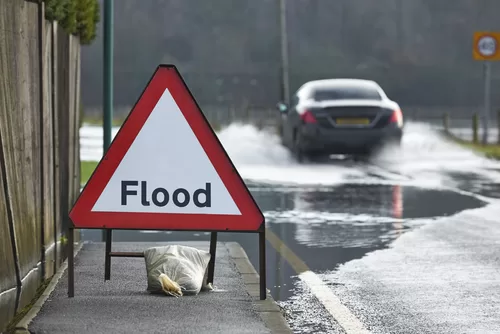Home insurance is essential to protect your property against a range of risks, including fire, theft and natural disasters. However, many homeowners are unaware that standard homeowners insurance policies generally do not cover flood damage. With climate change leading to more severe weather and more frequent flooding, it’s important to consider whether adding flood insurance to your current policy is a smart move.

What is flood insurance?
Flood insurance is a type of insurance policy that covers damage to your property caused by flooding. Flooding can occur due to heavy rains, rising water levels in rivers or lakes, or coastal storms. Unlike other types of insurance policies, flood insurance is usually not included in a standard home insurance policy and must be purchased separately.
According to the National Flood Insurance Program (NFIP), the average cost of flood insurance in the United States is around $700 per year, but this can vary significantly depending on the factors mentioned above. It is important to note that flood insurance is generally not covered by a standard home insurance policy. It is therefore essential to take out a separate policy if you live in an area prone to flooding.
Benefits of adding flood insurance to your home insurance policy
Adding flood insurance to your home insurance policy has several benefits, including:
- Flood Damage Protection – Floods can cause significant damage to your home and property, including structural damage, mold growth, and water damage. With flood insurance, you can protect your investment and avoid the financial burden of repairing or rebuilding your home after a flood.
- Peace of Mind – Knowing that your home is flood-proof can give you peace of mind and allow you to focus on other areas of your life. You won’t have to worry about the financial impact of a flood or the stress of the aftermath.
- Affordable Coverage – Although the cost of flood insurance can vary depending on the location and risk level of your property, it is often more affordable than other types of insurance policies. The NFIP offers affordable rates and many homeowners may be eligible for discounts depending on the risk level of their property.
- Required by lenders – If you live in a high-risk flood zone, your mortgage lender may require you to purchase flood insurance. Although you’re not required to have flood insurance, it’s always a good idea to consider adding it to your policy to protect your home and belongings.
- Covers more than homeowners insurance – Flood insurance policies typically cover more than the structure of your home. They can also cover damage to your personal property, including furniture, electronics and clothing.
Risks of adding flood insurance to your home insurance policy
While there are many benefits to adding flood insurance to your home insurance policy, there are also some risks to consider, including:
- Cost – Adding flood insurance to your policy can increase your insurance costs, which can be a significant expense for some homeowners. However, the cost of flood insurance is often much lower than the cost of repairing or rebuilding your home after a flood.
- Low Flood Risk – If you live in a low flood risk area, you may not need to add flood insurance to your home insurance policy. However, it is important to remember that floods can occur in any area and it is better to be prepared than to face the financial burden of flood damage.
- Limited Coverage – Flood insurance policies usually have coverage limits, which may not be sufficient to cover all damage caused by a flood. It is important to review your policy carefully and consider purchasing additional coverage if necessary.
- Waiting Period – If you are purchasing flood insurance for the first time or renewing your policy, there may be a waiting period before your coverage begins. This waiting period can vary from 30 days to several months, depending on the policy.
The cost of flood insurance can vary depending on several factors, including the location of the property, the risk of flooding in the area, coverage limits, and the chosen deductible. Generally, if the property is located in a high risk flood zone, the cost of flood insurance is likely to be higher than if the property is located in a low or moderate risk flood zone.
Final Thoughts
Adding flood insurance to your current home insurance policy can provide valuable protection against the financial impact of flood damage. To get an accurate estimate of the cost of flood insurance for your property, it’s best to speak with a licensed insurance agent who can provide you with a personalized quote based on your specific needs and circumstances.
